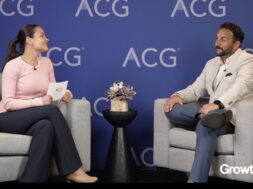Middle-Market Public Policy Roundup
The SEC approved a proposal to expand accredited investor status, the Department of Labor changed overtime regulations, and the House reauthorized its fintech task force.

With contributions by Maria Wolvin.
Updated on Dec. 19
In this week’s roundup, we look at the Securities and Exchange Commission’s decision to approve forthcoming changes to the accredited investor definition. We also examine a rule change from the Department of Labor that could impact overtime pay and employee benefits, and an announcement from the House Financial Services Committee reauthorizing its fintech task force.
The Middle-Market Public Policy Roundup will be off next week for the holidays.
SEC Votes to Approve Expanded Accredited Investor Definition
More investors could soon have access to private markets following a Wednesday decision by the Securities and Exchange Commission.
In a 3-2 vote, SEC officials agreed to propose amendments expanding the definition of “accredited investor,” which the agency would approve at a later date pending public comment.
“The proposal seeks to update and improve the definition to more effectively identify institutional and individual investors that have the knowledge and expertise to participate in our private capital markets,” the SEC said in a statement.
Accredited investors are defined under current law as individuals with an annual income that exceeds $200,000 or a net worth over $1 million. One must qualify as an accredited investor in order to participate in the unregistered securities offered by hedge, venture and private equity funds–criteria intended to ensure investors are financially sophisticated enough to understand the potential loss that can come along with riskier investments.
“The current test for individual accredited investor status takes a binary approach to who does and does not qualify based only a person’s income or net worth,” SEC Chairman Jay Clayton said in a statement following the Dec. 18 vote. “Modernization of this approach is long overdue.”
Under the new proposal, accredited investor status would be expanded beyond its wealth-dependent limits, which Clayton has repeatedly supported.
“There are a number of people who have the sophisticated ability to assess investments who may not meet those wealth thresholds,” Clayton said during a Senate Banking Committee meeting on Dec. 10. “And we should do a better job of identifying [them].”
Under the new proposal, there are several changes to the accredited investor definition that are consistent with the comment letter ACG submitted this summer in response to the SEC’s related Concept Release. For example, the proposal adds new categories to the definition that would allow those with certain professional certifications and designations, such as a Series 7, 65 or 82 license, or other credentials issued by an accredited educational institution to qualify. With respect to investments in a private fund, the proposal adds a new category based on the person’s status as a “knowledgeable employee” of the fund. The SEC also proposes to update the definition to allow family offices with at least $5 million in assets to qualify for accredited investor status.
In addition, according to the SEC’s fact sheet, the proposed amendment will add limited liability companies that meet certain conditions, registered investment advisers, and rural business investment companies to the current list of entities that may qualify as accredited investors. It also includes a “catch-all” category for any entity owning in excess of $5 million in investments.
For institutional accredited investors, the proposed amendment adds a category that would permit institutional accredited investors to qualify as qualified institutional buyers (if they are already not included in that definition) if they meet a $100 million in securities owned threshold.
Before the SEC can move forward with finalizing the proposal, there will be a 60-day period for public comment.
Labor Department Updates Nonexempt Overtime Regulations
The Department of Labor announced a final rule that could incentivize employers to offer benefits to their workers by updating a more than 50-year-old old law on time-and-a-half pay.
The rule, effective Jan. 15, updates portions of the Fair Labor Standards Act that determine how employers calculate regular rate pay for employees, which impacts how overtime is determined.
The updated rule allows employers to exclude perks and benefits—such as unused sick leave and paid time off, parking benefits, wellness programs, gym access and more—from an employee’s regular pay, potentially shrinking overtime liability while incentivizing employers to offer a wider range of benefits to workers.
“In a robust economy with a million more open jobs than job seekers, we must allow employers to offer perks and benefits that will attract talent for open jobs and compensate employees for their hard work. This rule is an important step in that direction,” Labor Secretary Eugene Scalia said in a statement following the rule’s passage on Dec. 12.
Scalia, son of the late Supreme Court Justice Antonin Scalia, took the reins of the department in September following the departure of the previous secretary in July.
Financial Services Committee Renews Fintech Task Force
Through a recent legislative package, the House Financial Services Committee has passed a resolution to reauthorize a group responsible for gathering information about the financial technology industry.
Effective Jan. 7, 2020, the resolution reauthorizes the Financial Technology Task Force to operate for an additional six months. Committee Chairwoman Maxine Waters, D-Calif., set up the task force in May.
According to a press release, the group will have the same scope that it had during the six months ending in December.
Rep. Stephen Lynch, D-Mass., will continue to chair the task force. Its ranking member will be Rep. Tom Emmer, D-Minn.
Are you an ACG member who enjoys reading the public policy roundup? Join our Public Policy Interest Group to receive even more in-depth coverage of federal policy activity impacting the middle market, as well as opportunities to help shape ACG’s advocacy efforts.

Benjamin Glick is ACG Global’s marketing and communications associate.


